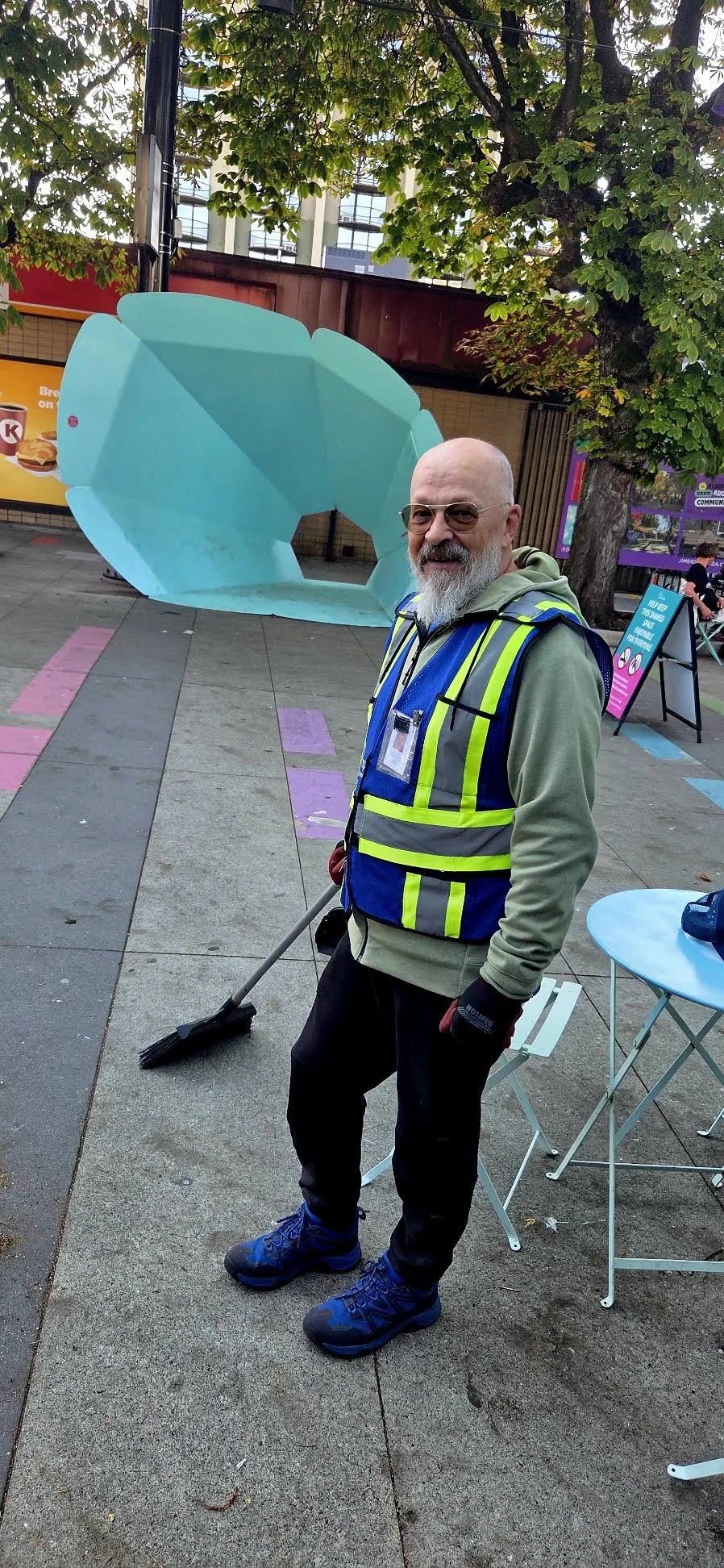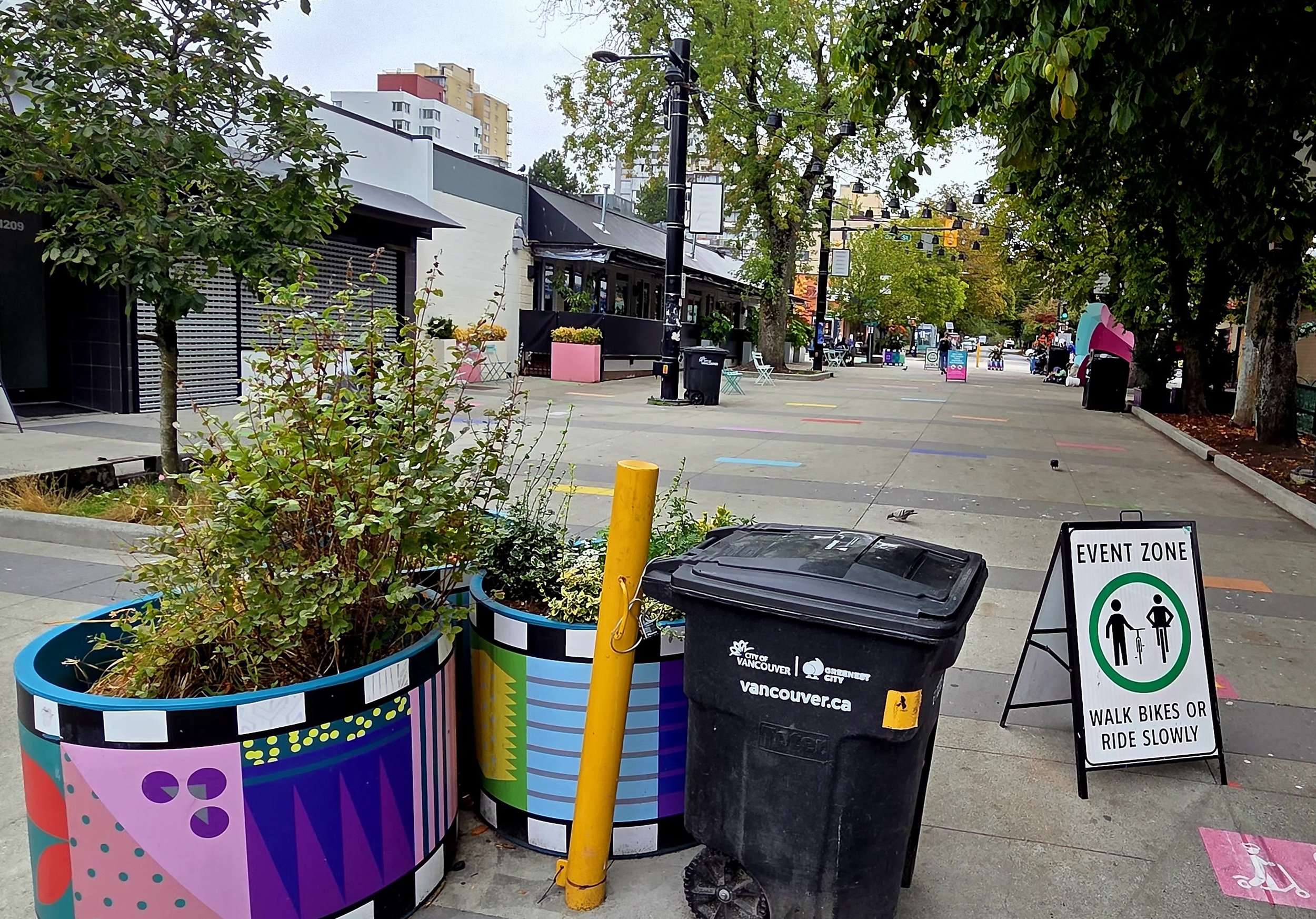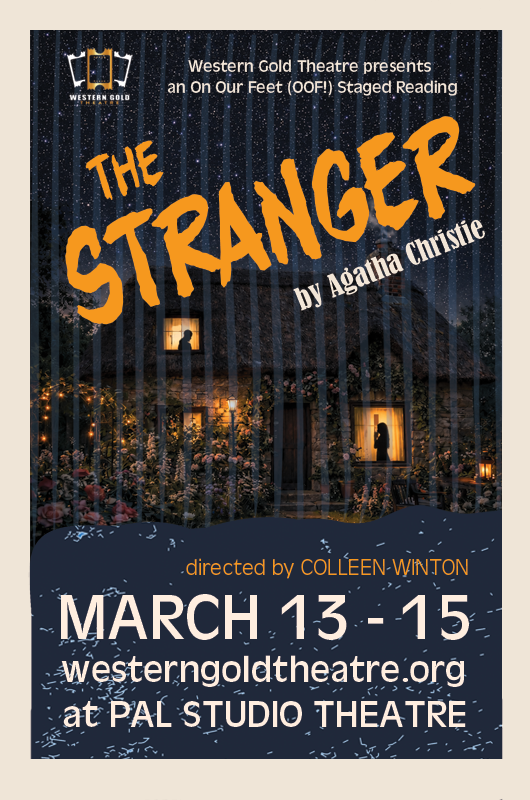UNSUNG HEROES
/INTRODUCING “UNSUNG HEROES”
This is the first of an occasional series of stories about West End and Coal Harbour individuals who make a special, and often unrecognized, contribution to our community. If you would like to nominate an “Unsung Hero” email your suggestion to editor@thewestendjournal.ca.
KEEPING JIM DEVA PLAZA SHIP-SHAPE
by Michelle Livingstone
(click images to enlarge)
I meet Randy Keats on a sunny morning, at his place of work, putting out the tables and chairs ready for the day ahead. A big grin on his face; his bright work vest proclaiming him the guardian of the Jim Deva Plaza. He walks over to me, and it's soon apparent that his personality is as big as his smile.
Randy Keats, the guardian of jim deva plaza. (James Oakes Photos)
Originally from Windsor, “..not Grand Falls but Windsor”, he assures me; a little place in the beautifully rugged province of Newfoundland. The youngest of the family, his mother - an apparent supermom, who not only kept house, but kept it for ten children, whilst his father was a night watchman for 40 years at the local paper mill.
Randy began his own watchman career working at the Jim Deva Plaza two years ago, as a Community Navigator via the non profit organization, Mission Possible and BIA (Business Improvement Association). A friend in his building asked Randy if he’d be interested in helping out at the plaza a few hours a week, and the rest is history.
Prior to tending the plaza, Randy spent most of his career as an employment counselor and helped over 3,000 people with their career paths. He moved onto working with at-risk youth, before taking retirement. Still not content to sit down and relax fully, Randy became the Fire and Life Safety Officer at 725 Granville, host to the likes of Microsoft and Sony Imageworks.
Even though things have now slowed down a little, he's still passionate about caring for the environment and those around him.
A typical day's work, from Tuesday to Friday, starts when he arrives around 9 a.m. when some of the local businesses are just beginning to open. He works for two hours cleaning the plaza, which can be as small as a sweep up of cigarette butts, empty drink canisters and general garbage, but more often than not involves moving cardboard boxes, chairs, coffee tables and the shopping carts before having a well deserved break, and returning in the early evening around 5 p.m. for another two hours to clean up the day’s debris.
For deep cleaning, a few times a year the BIA pressure washes the plaza.
In fair weather jim deva plaza is a busy community hub, with joggers, strollers, and live music.
“Which they did the Thursday before our August long weekend, which also happened to be Pride", Randy says, “And so the Plaza was pristine for about 24 hours. Then of course afterwards this place was a catastrophe but I recruited one or two Plaza regulars to help out and I gave them a gift card from Blenz. The nicest thing here for me is the opportunity to have met the local neighborhood, there are some very nice people that come through and socialize”
A dapper gentleman with white pants and a matching little white dog are firm favourites of Randy's.
“Coco the little dog is a delight. Whenever David, his owner, comes to the plaza with Coco, I generally get to spend a nice little bit of time with Coco. I love Coco, and Coco loves me.
“And there's another regular of the plaza”, he says breezily waving at a smiling lady who is waving enthusiastically back at him. He mentions that she and her husband live in the building next door and that they regularly participate in the Plaza’s activities, such as ‘Friday Night Jazzy Jams’, which run from 6.30 - 8.30 p.m. in the summer.
this sign posted in the plaza sums it up.
“We'd have five musicians as the core, but then it was otherwise open mic. People could come and sing a song, but also if they wanted to show up with their guitar, or their saxophone, they sign up for one or two songs to do with the band. It’s a nice activity. Every other Thursday night, we’d have Luke on piano, and that's kind of more like a piano lounge”.
As Randy ends his enthusiastic rundown of the events, there’s no doubting the love and affection that folks have for Randy, as yet another favourite character, Jason, a jolly community policeman, cycles along and a good natured banter takes place.
But it's not all fun and games, as the substance abuse gatherings reflect. Anyone who’s been around the plaza can attest that the problem is almost out of control. Randy deals daily with a few individuals who sadly have mental health issues and who he feels are not being cared for correctly. Not just the bands of drinkers and smokers that congregate, but those who openly use crystal meth, which of course leads to loud, antagonistic behaviour, very much in strict opposition to a welcoming neighbourhood area fit for children and elders alike.
Randy has a few thoughts on this.
“Every one is welcome, but not all behaviours are. We need a massive societal shift where what used to bear consequences in the past start bearing consequences again today, and that means if you break a bylaw, that the actual consequences of breaking that are enforced, because we're at a point now where with no enforcement it's a free-for-all”.
Once the heady evenings of summer events pass and the reality of winter sets in, it's not unusual to find folks not just sleeping in the bright pink megaphone but also leaving a few tokens of non-appreciation that need to be cleaned up and hosed down before the plaza is opened.
Recently a regular of the area has begun his own little art installation by piling small rocks around the area, adding to not only the unsightliness but also offering a tripping hazard along the way. I ask Randy how he thinks this could be dealt with and he answers:
a quiet moment in the plaza.
“By bringing the neighborhood together and having a presence, in essence what might be considered as taking back our community. So the local residents need to somehow organize to come back and be a presence, so that our presence squeezes out their presence and not what's happening now, the vice versa”
Another idea he has for the non-stop proliferation of cigarette butts would be to have a five cent butt return similar to what’s available for empty cans and bottles.
“As a community navigator, I would much rather interact with the general public, as I often will do, especially tourists, to let them know where things are. Where's a good place to go and eat? Or where can I find the closest pharmacy? Or talk about the events that are coming up in the plaza over the summertime, as opposed to okay I just spent an hour going around cleaning. It's about respect, respect yourself, respect your place and respect Mother Earth”.
A trained shaman and ordained metaphysical minister, Randy is no stranger to the spiritual side of life, having traveled to India as a young man in 1981, where he met Swami Shah (“The most pivotal experience of my life”) and he tells a story from one of his favourite memories.
His father built their lakeside cottage 20 miles away from his childhood home, where long hot summers were spent happily swimming, rowing and lazing around. But years later when as a university student he returned home for the summer, Randy was rowed out to a trio of lakes with his friends, called ‘The Badgers’, where a local amateur archaeologist had collected arrowheads and other artefacts that had belonged to the now extinct Beothuk Peoples, and who had also built a winter Mamateek. As Randy sat in the Mamateek, gazing at the fire in the centre, he felt an overwhelming sense of enchantment “I had goosebumps the size of golfballs”, he says.
Following meticulous research, he discovered that in 1829, William Epps Cormack, a Scottish Canadian explorer, asked Shanawdithit, the solitary survivor of the Beothuks (who 25 years ago was made a person of national historic significance) to relate her People’s history and customs through maps and stories. Her work for Cormack established that ‘The Badgers’ were part of an paramount Beothuk settlement area known as Indian Point and that the place where Randy had been sitting was the very same spot where Shanawdithit had sat many years ago.
With delicious shivers from such a great story, I end my interview with asking what Randy’s one wish for the world would be:
“That people take a step back into reality, otherwise the social fabric will come undone and then as a society we’re doomed, and I say that meaning what goes on in your head or an individual's head does not necessarily constitute a reflection of reality and reality for me is more so the consensus of our forefathers and foremothers that have been handed down to us through generations as in, you know, we don't allow this.”
And in the next breath, Randy waves and shouts a hello to another local; his energy and passion for helping others seemingly never ends.
The unsung hero of Jim Deva Plaza on a mission for cleaning litter and spreading love.








